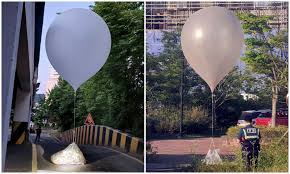
North Korea announced on Sunday that it would cease its practice of sending balloons filled with trash across the border into South Korea. This decision follows days of tension as the North launched nearly a thousand balloons carrying waste materials ranging from cigarette butts to cardboard and plastic.
The trash balloon campaign was initiated by North Korea as a response to what it perceived as propaganda activities conducted by anti-regime activists in the South. While Seoul condemned the act as “irrational” and “low-class,” it did not violate UN sanctions against North Korea.
In response to North Korea’s trash balloon campaign, South Korea warned of strong countermeasures unless the North halted the activity, citing violations of the armistice agreement that ended the Korean War hostilities.
Late on Sunday, North Korea announced that it would suspend the campaign after scattering what it claimed was “15 tons of waste paper” using various devices. The North characterized the campaign as a “pure countermeasure” and warned of escalating retaliation if South Korea resumed anti-North propaganda activities.
The trash-filled balloons had been landing in northern provinces of South Korea, including heavily populated areas like Seoul and Gyeonggi. South Korea’s Joint Chiefs of Staff confirmed the contents of the balloons, which included waste such as cigarette butts, scrap paper, fabric pieces, and plastic.
The National Security Council of South Korea convened to discuss potential responses, including the resumption of loudspeaker propaganda campaigns along the border. In the past, such broadcasts have led to tensions with Pyongyang.
The trash balloon campaign is part of a history of propaganda offensives between the two Koreas, occasionally escalating into larger confrontations. North Korea’s decision to cease the campaign comes amid concerns over its weapons testing activities and shipments to Russia.
Analysts have suggested that North Korea may be testing weapons before exporting them to Russia for use in Ukraine. South Korea’s defense minister reported that Pyongyang has sent approximately 10,000 containers of arms to Moscow in exchange for satellite technology.
Sources By Agencies


